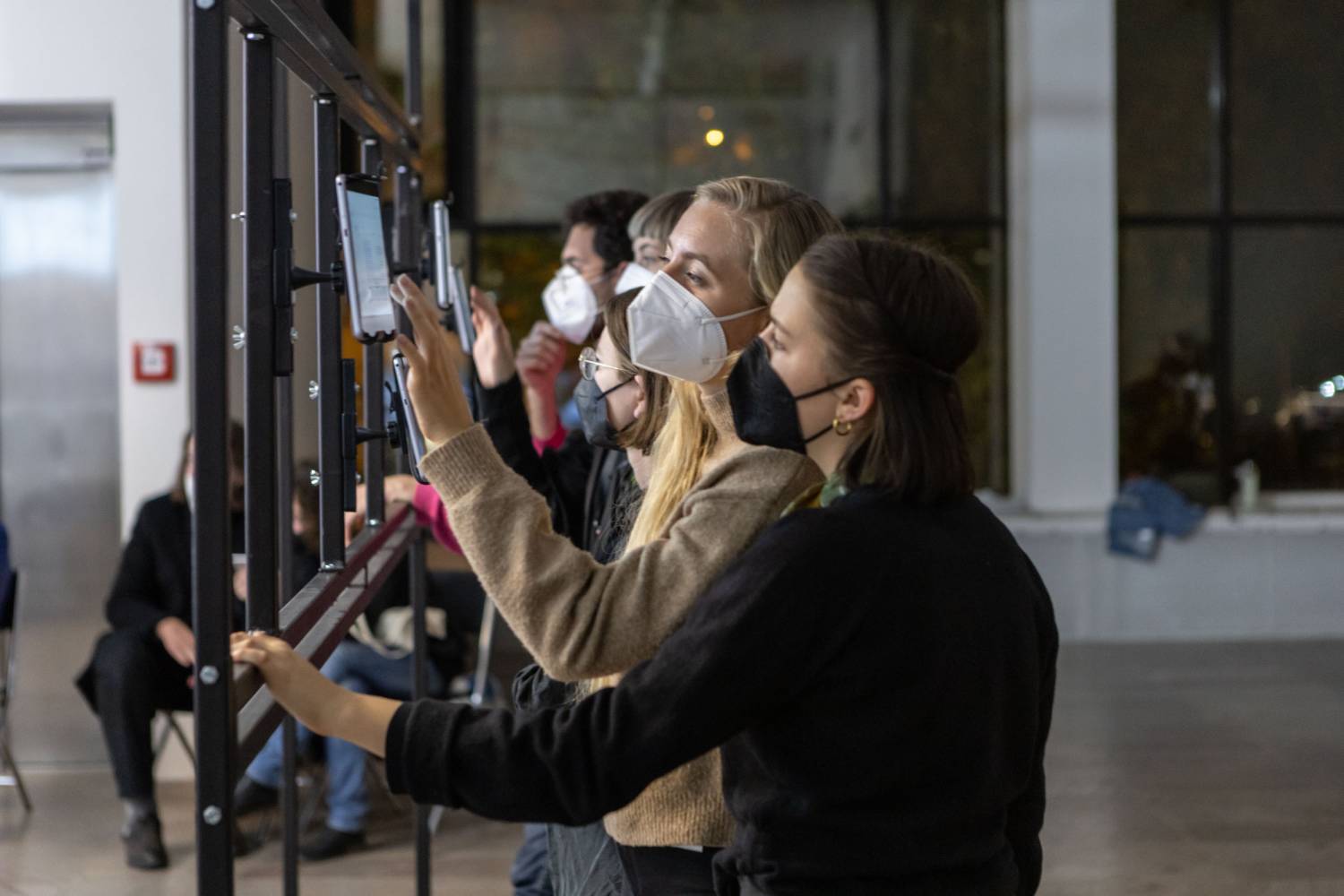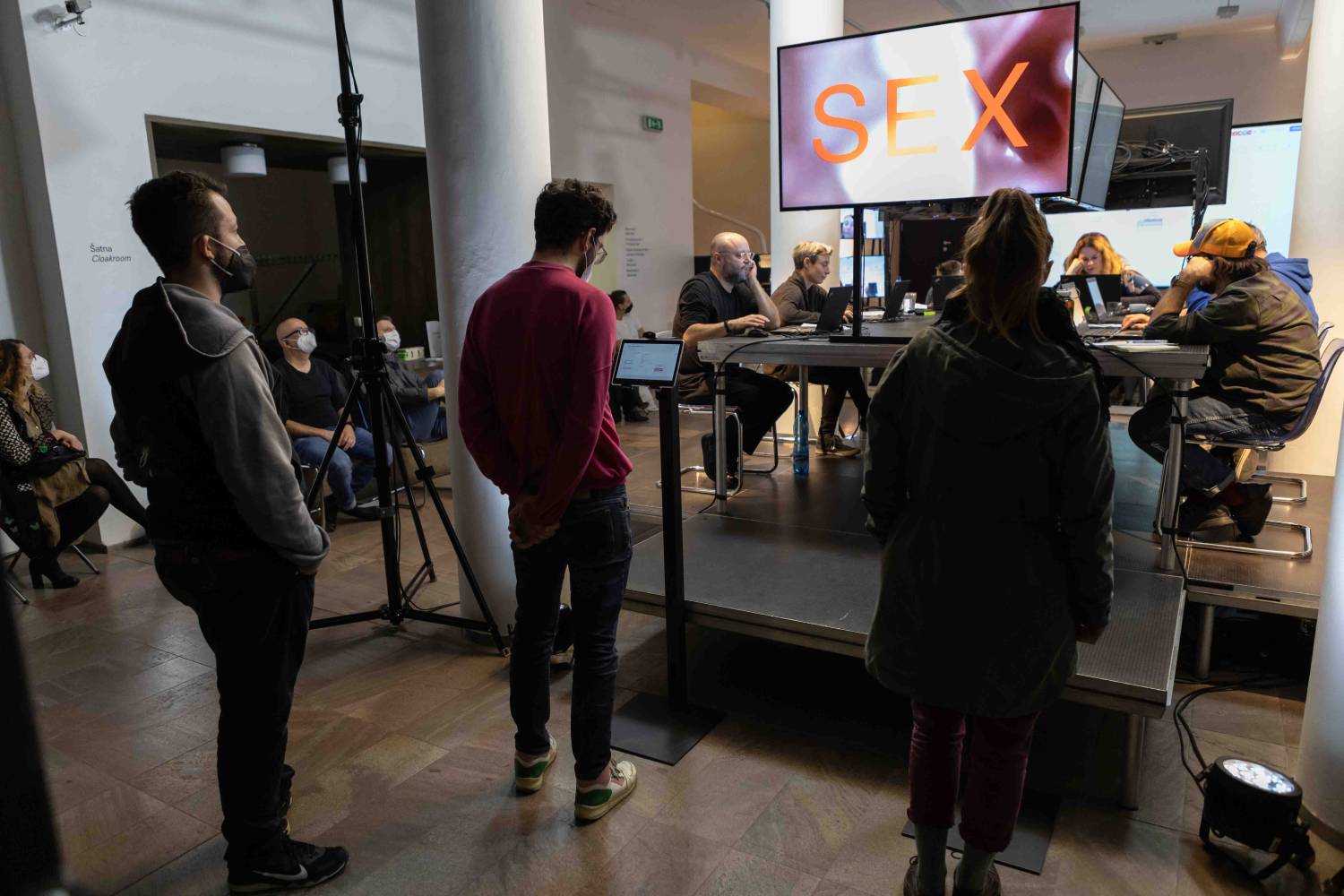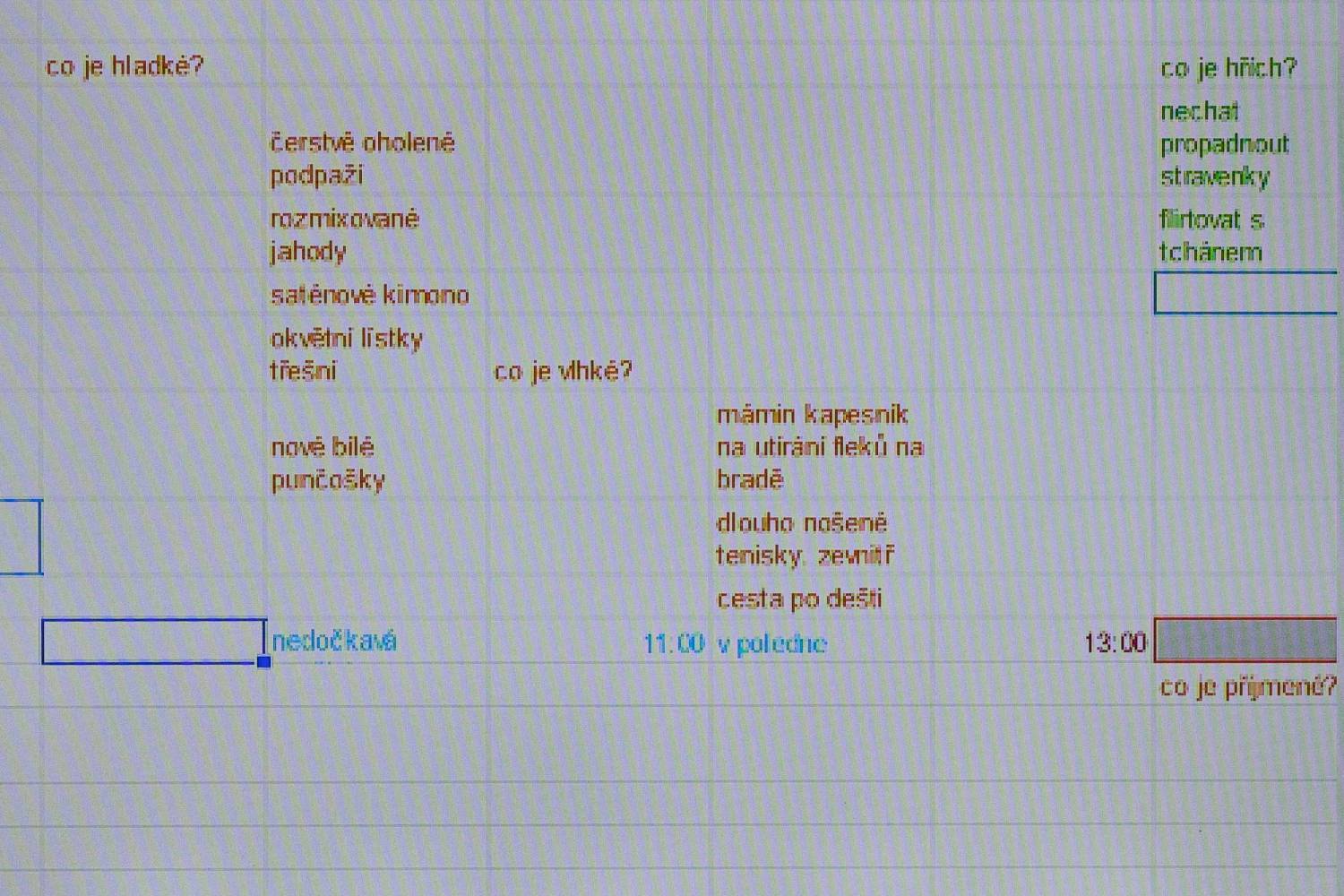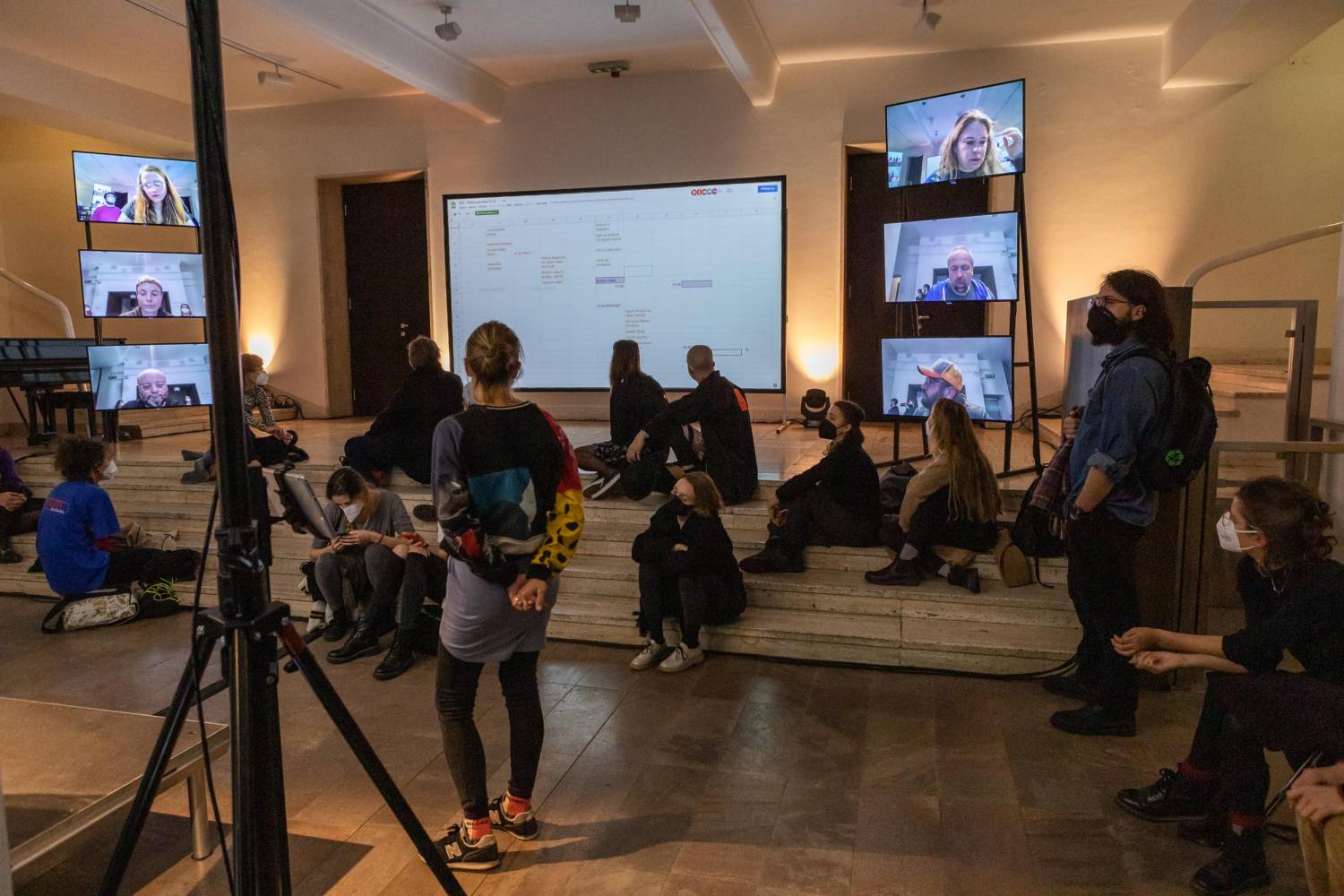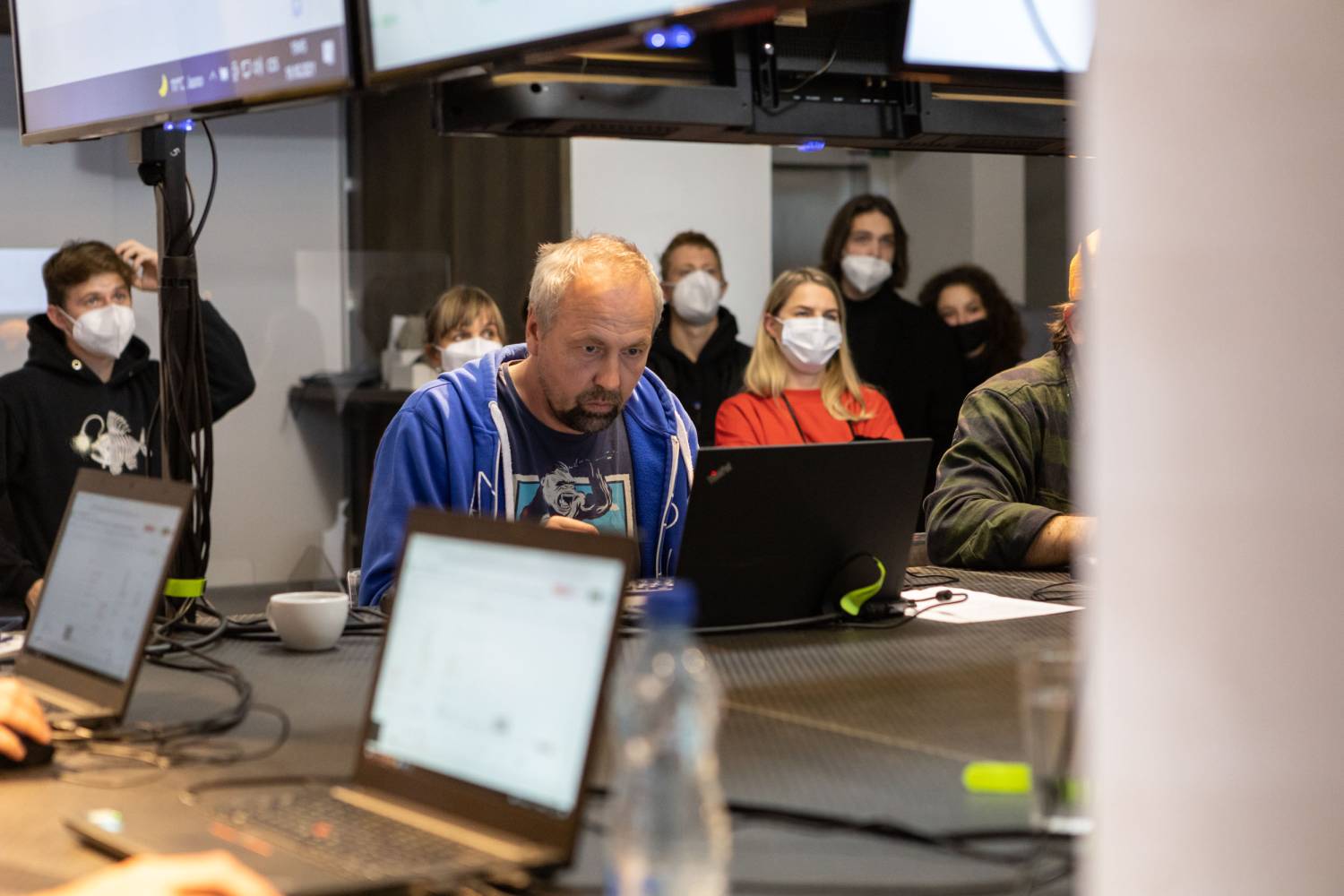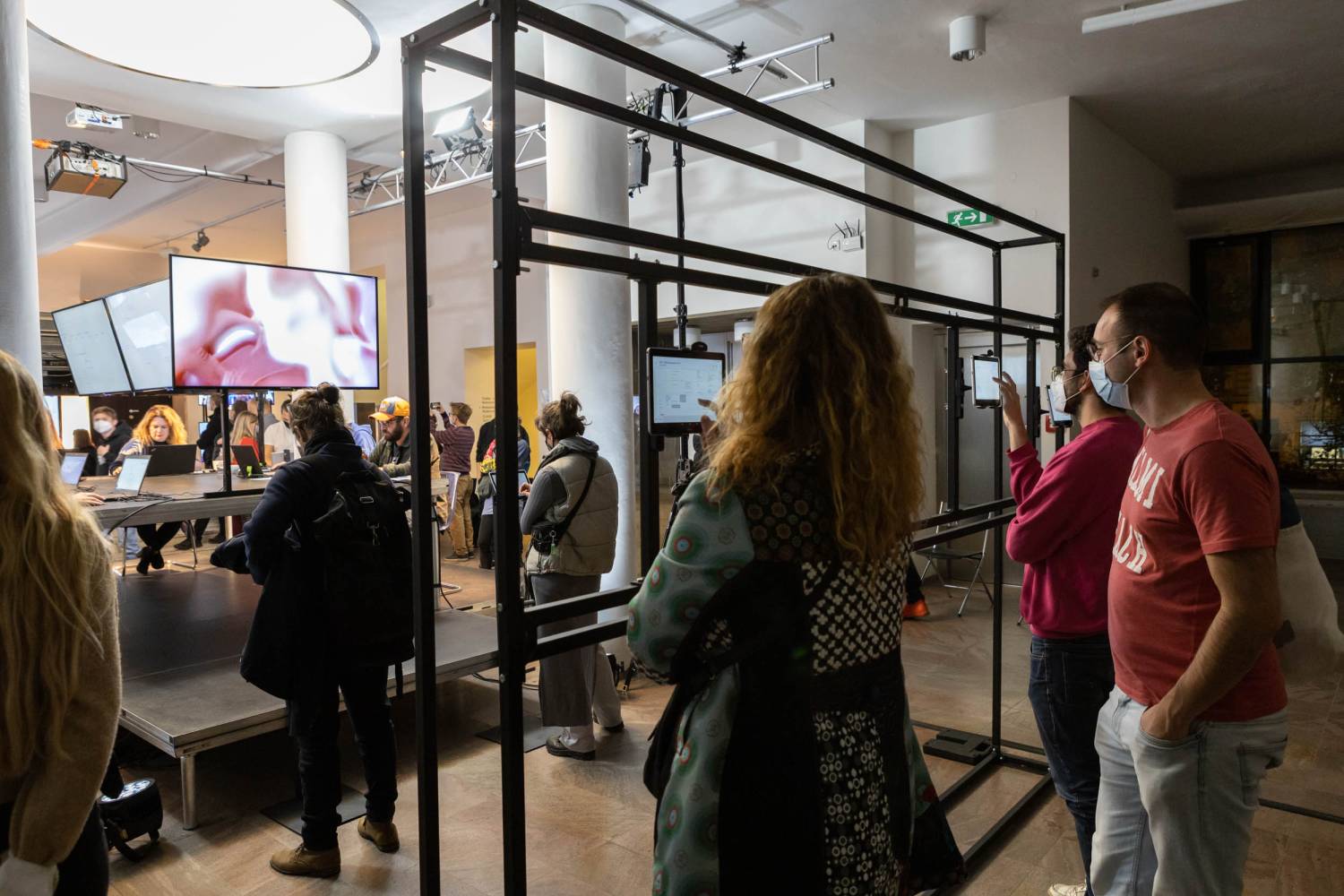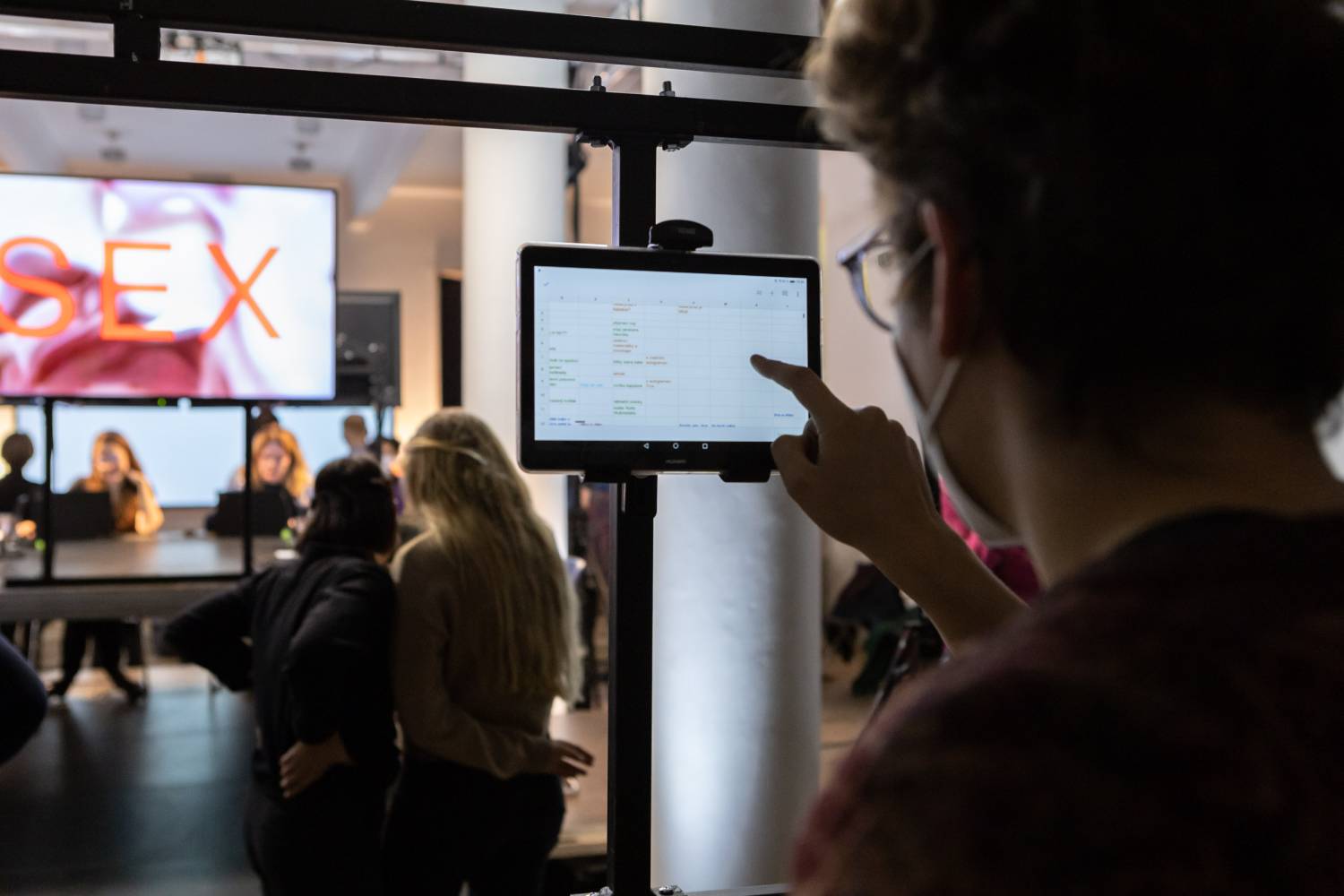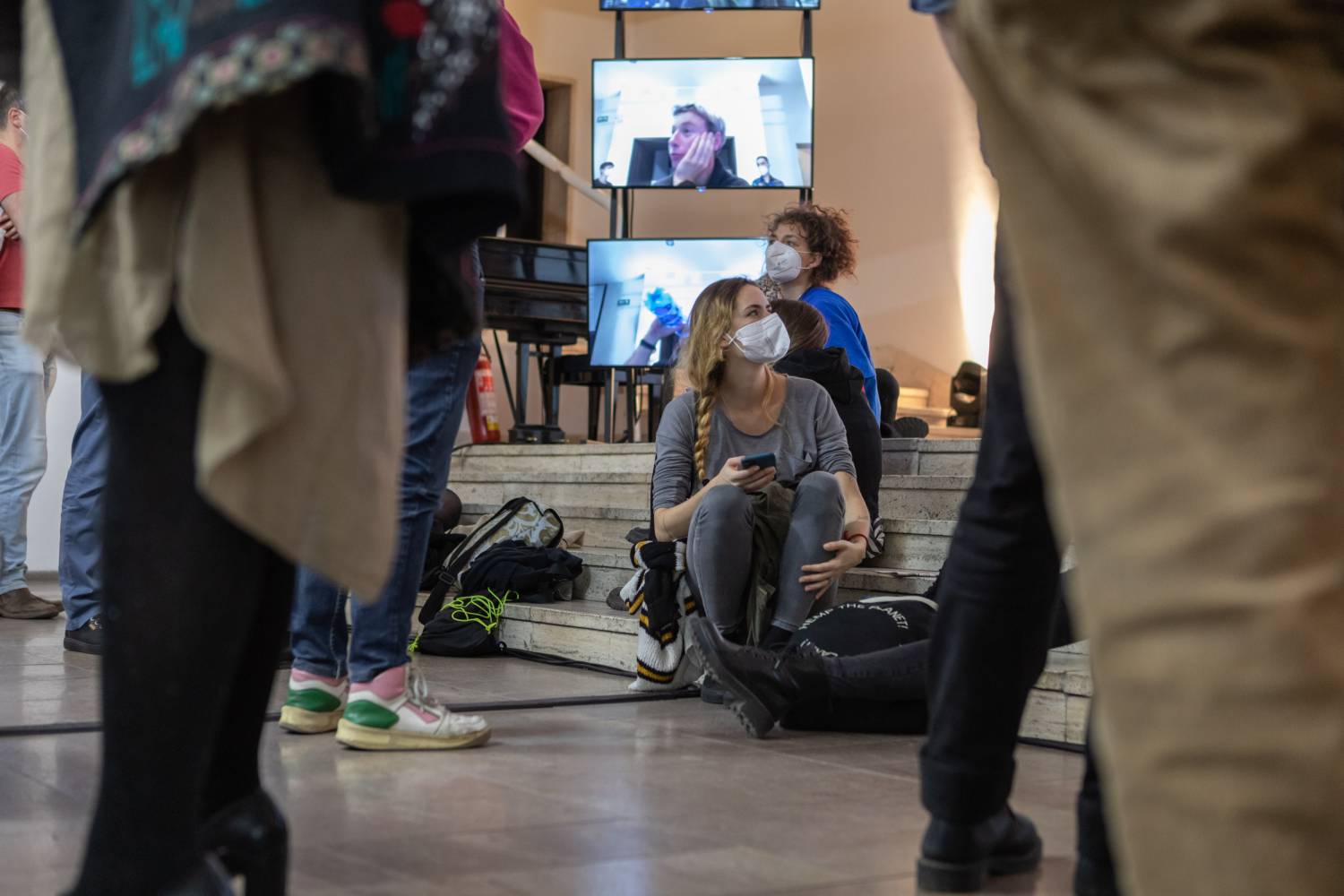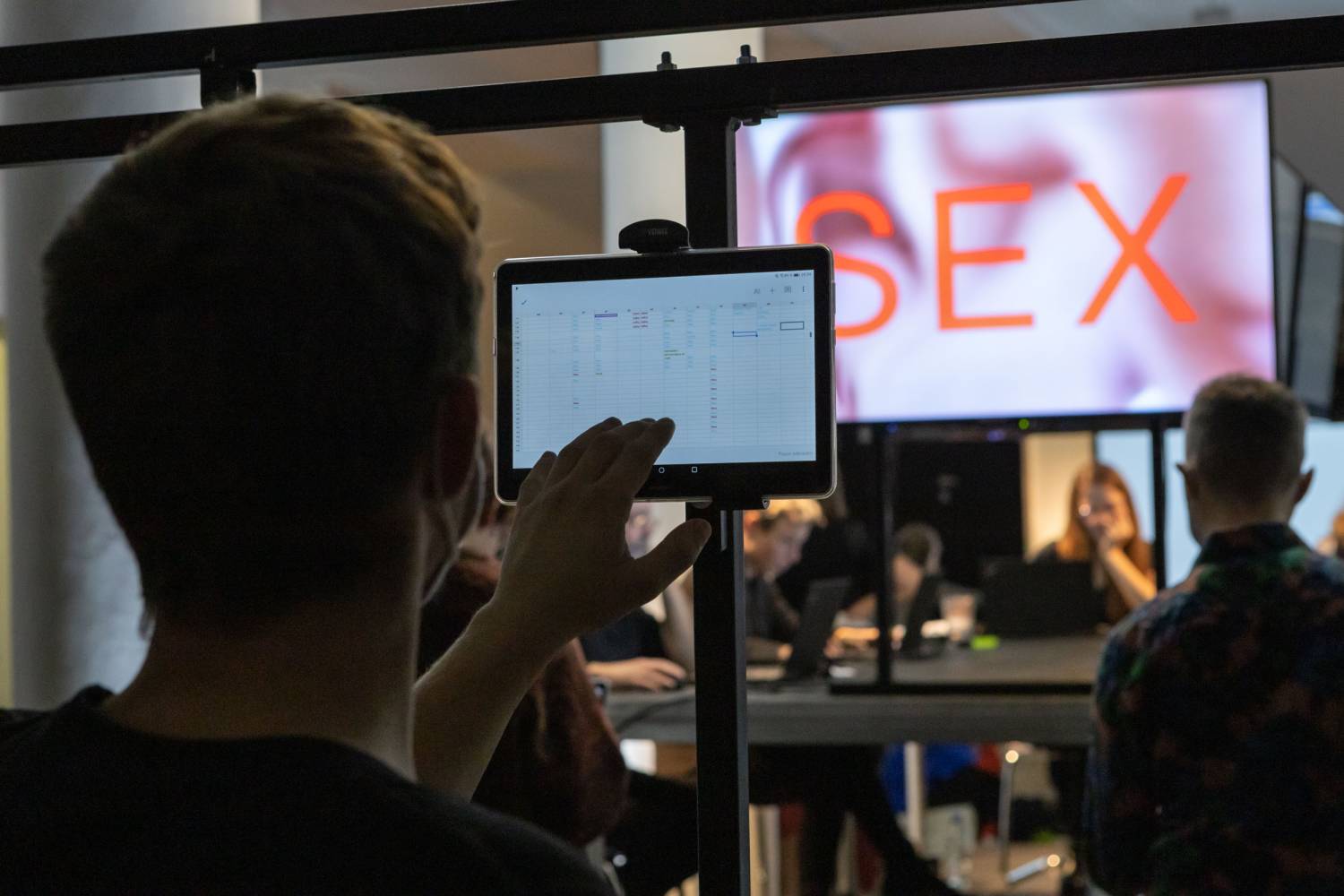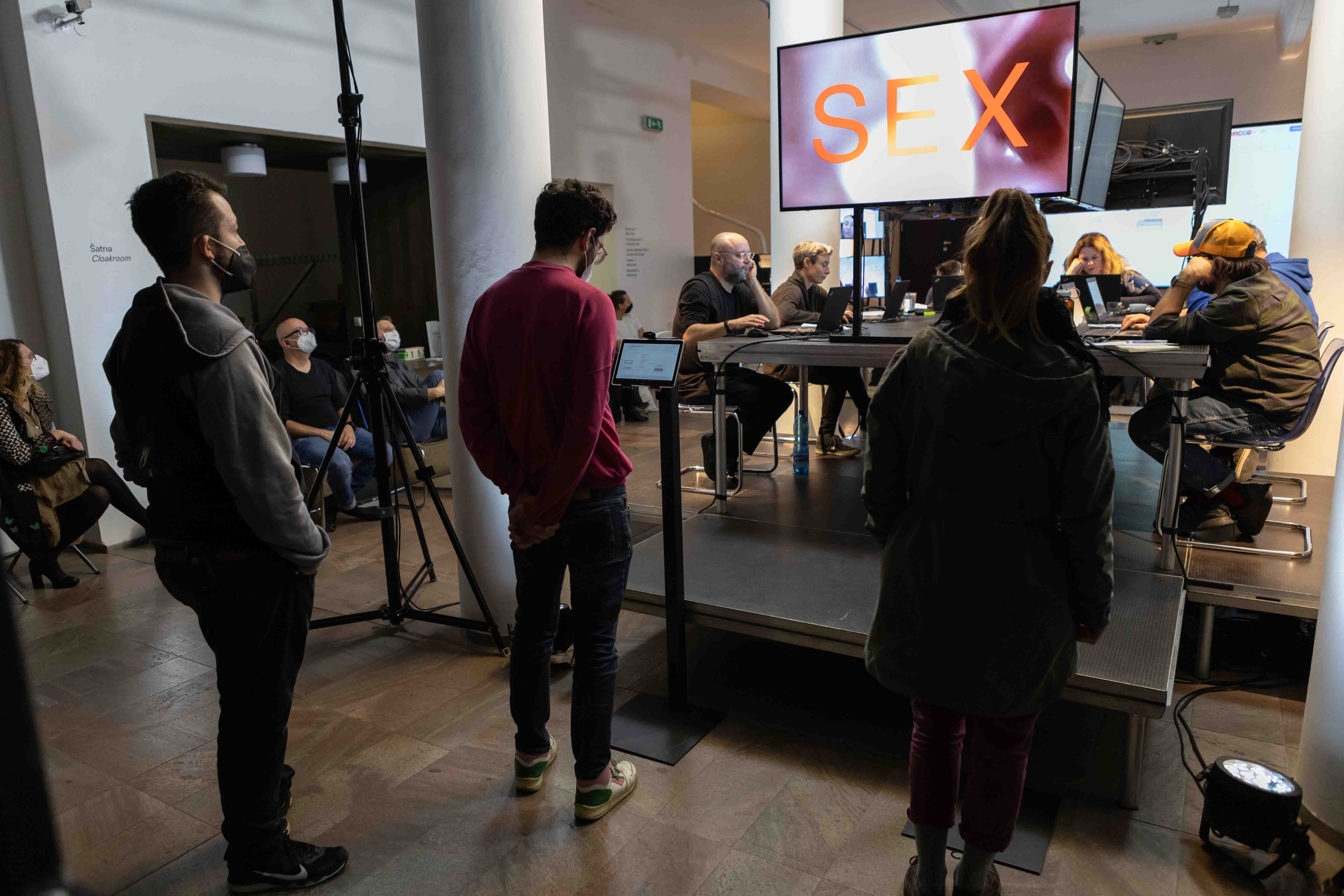
Whatever happened to space?
In the terrible tedium of the pandemic I saw myself falling into the rabbit hole of virtual worlds. Zooming out like passing out, zooming in like caving in…
Performing became talking in front of a cam, attending a performance became clicking to discover yet another talking head. WTF?!
Whatever happened to complex relations? I feel myself becoming a caricature of myself, as it almost feels like talking one at a time to a silent wall of nearly static faces, is a perfect substitute for the world.
Whining? No, just shocked that I, a performance-based being, let go so easily.
Suddenly, one day, an awakening: Whatever happened to space?! We all know performance is hiding in every corner (though without an actual stage as a reference that might feel a bit abstract). If voices can be words (hello? hello!), then finding the right corner may allow for a different type of performance - one that is much better at being a performance than the usual “I will tell you something on the cam and you just imagine it’s a stage” approach.
Here comes the spreadsheet.
The discovery is double:
In a collaborative document, performers can be writers. And writing live builds a performance. We see them act. We witness their decision-making. Some of it may be planned, but clearly some reactions, initiatives, collaborations, happen spontaneously. Their characters, personas, affects, are so different. They treat this quasi-abstract space in completely distinct, unique ways. It gains their flavor.
The spreadsheet reconstructs space. It brings back the idea of distance and proximity, of going elsewhere, of being in relation to. Remember when people would stand in different constellations when having a conversation? When they would move a bit sideways, tilting just a bit when they didn’t know each other well, or when they wanted to distance themselves from what was being said? Remember these shifts in positions? Remember getting closer and closer as a conversation developed? The spreadsheet puts the players on a grid, giving them a position. Be gone, one-directional, linear narrative! Give way to the ambiguous space of X,Y. Finding yourself and losing yourself are once again actual things.
Why sex?
Sex is about regaining intimacy. About being in a space different from the one I’m in. About the fantasy of spending time with another body, of finding oneself in someone else’s folds, of regaining the notion of difference. In that sense - it is of course a transgression, always and forever, though it’s not to be confused with any notion of guilt or immorality. I mean, come on, we’re all grown up and this is a safe space.
This is a safe space.
This is a literary space.
This is a space where the words travel and dance and join to become a world. When it works, it’s a fragile state of togetherness.
When it doesn’t, well, you move on.
Somewhere else. To another piece of that space, to another hopeful narrative, meaningful word, explicit opening.
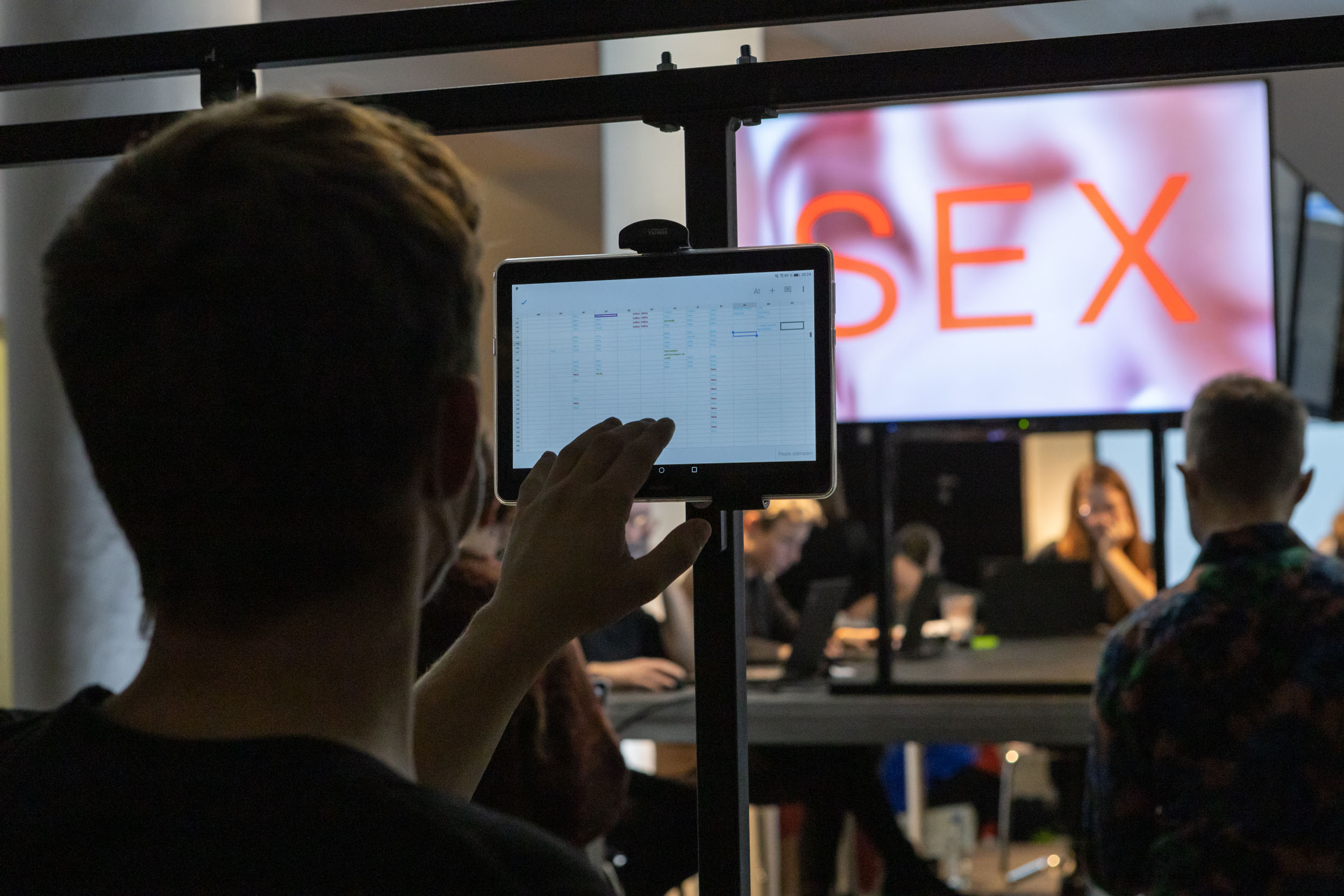
Wojtek Ziemilski
Wojtek Ziemilski: Sex
The staging project of the Polish director Wojtek Ziemilski with the provocative but also mundane title Sex represents a unique space built by six performers who weave a branched literary landscape together. Internationally acclaimed director, choreographer, and pedagogue Ziemilski likes to test the boundaries of theatrical language and its interfaces, intersections, or friction with other artistic disciplines. In the latest project Sex, in which the actors build a two-dimensional textual space in a shared document, he decided to work significantly with a live event and the way of its problematization through new and currently dominant forms of online communication. It fulfills its process of creation, discussion, and the act of writing in the digital environment of a spreadsheet, but also through a strong scenic form with the obvious presence of performers, artistic gesture, time frame. Even writing proves to be exciting, sensual, shy or defensive, and full of masks, especially when it can be observed as a process, dialogue, an attempt to communicate or share loneliness, fragility, and intimacy. However, writing about corporeality, love, sensuality in the inert environment of a computer spreadsheet is never neutral - it can excite, offend, disrupt expectations, downplay things, but mainly spread and grow in many directions, arise in blocks, but also isolated islands. It is a collective act, but also an author's interplay of six significant individuals.
Sex is not only a theme but also a form of communication. Sex is a springboard for a textual performance, which, however, also touches on the format of the gallery installation, as the six actors actually physically meet and create in the gallery space of the Brno House of Arts. The production, in its scenographic gesture, flirts with the events of live meetings of computer game players, in which the audience is shown their game operations. Ziemilski with writers, musicians, artists and editors Bernardeta Babáková, Markéta Lisá, Zuzana Fuksová, S.d.Ch., Ivan Palacký and Vojtěch Staněk open the possibility to perceive the work Sex only as a literary act, as the work also has its online form, where the emphasis is put on the text itself and the process of its creation. In theatrical form, the project touches on the border between gallery installation and performance with an important dimension of its now and here, but with the knowledge that communication itself takes place in a virtual environment. The scenography of this lush event works with several forms and degrees of representation of the written.
Wojtek Ziemilski (*1977) is a theatre director, writer, choreographer and visual artist. His performances have been shown in over 20 countries, at events such as the Ruhrtriennale, the Prague Quadriennial, Festival Boska Komedia. He won awards such as the Main Prize of the Zürcher Theater Spektakel or the Main Prize of the Fast Forward Festival in Dresden. Ziemilski extends the idea of documentary performance. His work is often an inquiry into spectatorship and the possibility for action. By using tools such as devising, real-time composition, but also references from the world of visual arts and various media, he builds universes that combine aesthetic experience with intellectual inquiry. He teaches contemporary approaches to performance with a particular focus on devising techniques, connections between contemporary dance and theatre, and the use of media in performance. He is a lecturer at the National Academy of Dramatic Art in Warsaw and at the Warsaw University, and has been giving lectures and workshops across the world, e.g. at the Prague DAMU, UNIRIO in Rio de Janeiro, the Krakow National Theatre School.
Bernardeta Babáková (*1994) is a doctoral student of drama studies at the JAMU Faculty of Theater and partly works in social services and is involved in the Limity jsme my movement. She focuses mainly on poetry, short prose, screenwriting, work for radio, podcasts. In 2020, A Studio Rubín presented a stage reading of her play Quit livin' on dreams. She has long-term cooperation with the Studio of Intermedia at FaVU VUT. As part of this collaboration, she also participated on the book Sedimenty diagnózy wellness, which was published in 2021 by the Host publisher.
Zuzana Fuksová (*1983) studied social work and did not finish her German studies. In 2006, she co-founded the band Čokovoko with Adéla Elbel (albums Best od! and Hudba). In 2016, she published a book of posts and tweets Cítím se jako Ulrike Meinhof, in the Fra publisher. Since 2018, she has had the Buchty show on Radio Wave. Sometimes she writes columns - Finmag, Heroine, Radio Wave, translates from German, and tries to complete psychotherapeutic training. After a five-year episode in Prague, she lives in Brno again.
Markéta Lisá (*1979) graduated from the Academy of Arts, Architecture, and Design in Prague - Metal and Jewelry Studio; studies Theory of Arts and Gallery Education at MUNI in Brno. She deals with electronic music (Midi Lidi, Kutya), VJing, and fine arts. She lives and works in Brno.
Ivan Palacký (*1967) architect, musician. In the '80s and early 90's he played with various bands and participated in many music projects. He was a member of the group Výkřiky břich, the trio Sledě, Live Sledě, and the audiovisual duo Carpets Curtains. He is now an enthusiastic member of the Prague Improvisation Orchestra, singer and guitarist of the Pátí na světě band, a member of the Messier objects quartet. He writes an audio diary of all his travels; collects excerpts from stories, sounds, and various "acoustic errors". Since 2005, his main hobby has been "mining" sounds from the amplified knitting machine Dopleta 160 and 180.
S.d.Ch. (*1970) author of dramatic and prose texts, the comic book Varlén, collage artist, leader, lyricist, and composer of the band Ruce naší Dory, essential author of the Divus publishing house. He collaborates with the magazines Umělec, Svět a divadlo, the Rubato publishing house and the Polí5 label. His plays were performed by ČRo Vltava, ND Brno, Hadivadlo, Divadlo na provázku, Theatre association Kašpar. Winner of the Muriel Award, the Alfréd Radok Award, the tribute to the Next Wave, and the Ferdinand Vaněk Award.
Vojtěch Staněk (*1983) studied at the Literary Academy and the Faculty of Arts at Charles University. He works as an editor in a publishing house and on Radio 1 he presents a program called 13 syrových about experimental music.
